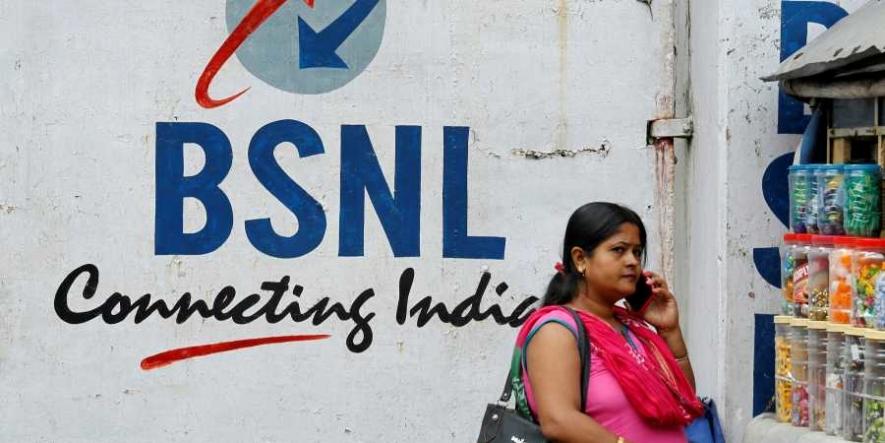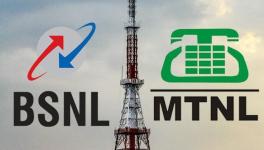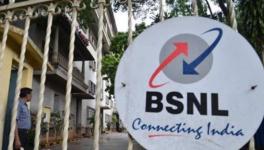How the Centre is Dismantling BSNL

Image Coutesy: New Indian Express
Amid reports and “speculation” that the Centre has urged the struggling Bharat Sanchar Nigam Limited (BSNL) to consider all options -- from a revival plan to disinvestment and even closure -- the future of the public telecom service provider hangs in balance. This at a time when thousands of its employees and unions are planning to go on strike after their repeated attempts to seek constructive intervention from the Centre to revive the loss-making public sector undertaking (PSU) have failed.
Also Read | #StudentsChaloDilli live: Students Reach Parliament Street, Chargesheet Modi Sarkar
Charter of Demands
BSNL employees and officers have given a three-day country-wide strike call from February 18 to 20, highlighting their long-pending issues. The proposed strike that has already garnered support from all central trade unions, excluding the Bharatiya Mazdoor Sangh (Rashtriya Swayamsevak Sangh’s labour wing), have put forward their demand charter. The demand charter includes implementation of the 3rd Pay Revision with 15% fitment; allotment of 4G spectrum to BSNL, as per the proposals submitted by the BSNL Management; implementation of the assurance of the Honourable Minister of State for Communications for delinking pension revision from pay revision; revision of pension of BSNL retirees with effect from January 1, 2017; payment of pension contribution by BSNL as per government rules; and settlement of the pending issues of the 2nd Pay Revision Committee.
While at the time of its formation, the decision for the financial viability of BSNL had been taken, it is yet to be implemented. Now, the employees and officers in BSNL are demanding issuance of a letter of comfort for BSNL’s proposals for taking bank loans along with filling up all vacant posts of the Board of Directors. They have also demanded the approval of BSNL’s Land Management Policy without any delay; completion of the mutation and process of transferring of all assets to BSNL, as per the Cabinet decision taken on the eve of the formation of BSNL; and scrapping of the telco’s outsourcing for operation and maintenance of its mobile towers, etc.
On the other side, the telco headquartered in Delhi has issued a statement that, “The Department of Telecom (DoT) is in the process of finalising a proposal for the revival of BSNL to be considered by the Digital Communications Commission (DCC) very soon," following reports revealing the Centre’s move to dismantle the BSNL. Earlier, a report by The Times of India had claimed that the direction from the Centre to the company to consider all options including closure was given after the BSNL officials’ meeting with telecom secretary Aruna Sundararajan.
How BSNL Became a Loss-making PSU
“Whatever the ongoing issues are, NITI Aayog, the think tank of the Centre, has added BSNL in the list of loss-making PSUs. They have also proposed the closure of BSNL, instead of reviving the ailing PSU,” said Swapan Chakraborty, deputy general secretary of BSNL Employees Union (BSNLEU), while talking about the current developments in the BSNL.
The public sector service provider had been making profits till 2009 since its introduction in 2000. However, in the 2017-18, BSNL had an annual loss of Rs. 7,992 crore whereas in 2016-17, the loss was Rs. 4,793 crore. But, BSNL was not the only service provider that faced loss during the same period.
“BSNL started making losses since 2009 after the tenders were cancelled, and the loss is simply due to the policies of the consecutive central governments (the then United Progressive Alliance and current National Democratic Alliance). Between 2000 and 2009, it was making profits of around Rs. 10,000 crore annually and at that time the number of employees was higher than the current number of employees,” Chakraborty told Newsclick. At present, nearly one and a half lakh workers are employed in BSNL.
In 2010, when the 3G spectrum auction had taken place, BSNL secured spectrum in 20 of its 22 circles and the BSNL had to pay Rs. 10,187 crore to the Indian Government. Mahanagar Telephone Nigam Limitted (MTNL) was also allotted spectrum in the two cities of Delhi and Mumbai. The private players-- Bharti Airtel, Anil Ambani’s Reliance Communications, Aircel, Idea, Vodafone, Tata Teleservices and S-Tel were also part of the auction. In total, the Indian government managed to raise Rs. 67,718.95 crore from the auction, with Rs. 50,968.37 crore from private telecom operators, and rest from the state-owned BSNL and MTNL.
Read More: BSNL Employees Oppose Carving Out of Separate Mobile Tower Company to Aid Pvt. Players
MTNL was among the loss-making Central Public Sector Enterprises (CPSEs) that could be sold out or being disinvested as per the list of NITI Aayog. At present, the Central government holds majority of its shares at 57% and the rest is held by domestic financial institutions, including individuals.
Chakraborty added, “Since the formation of the BSNL, we have been opposing a separate corporation as it slowly leads to privatisation. That is what is going to happen now.”
Though power equations changed in the Centre in 2014, the policy towards the public telecom sector has not changed. “Both the Congress-led UPA and current BJP-led NDA have been trying to dismantle the BSNL,” he said.
Again in March 2015, another auction for 3G spectrum had been held. Through the bid, the government had fetched Rs. 1,09,874 crore. In the auction, Idea Cellular, Reliance Telecom, Vodafone and Bharti Airtel had defended their existing spectrum holdings. But, Tata Teleservices, Uninor (Telewings), Aircel and Mukesh Ambani’s Reliance Jio- which offers only 4G services- had secured additional spectrum.
Read More: So What is Jio's Business Model?
Reliance Jio and 4G Spectrum Allocation
Reliance Jio was founded in 2010, while JioSoft had been launched in December 2015. However, the service became publicly available only on September 2016, shortly before the 4G spectrum auction. The five-day-long auction for the 4G spectrum was in October 2016 and the current government made Rs. 65,789 crore. Only about 11% of the expected auction of spectrum worth Rs. 5.6 lakh crore had been sold. Airtel secured spectrum worth Rs. 14,244 crore, Reliance Jio got it for Rs. 13,672 crore, and Idea for Rs. 12,798 crore, among other private operators.
As the Indian telecom industry had stepped into 4G spectrum era, except the public sector BSNL and MTNL, all the services providers were allocated spectrum. When Indian telecom industry is all set to provide 5G services- which is expected during the second half of 2019, BSNL is still waiting for 4G spectrum allocation.
“The government’s stand of not allocating 4G spectrum to BSNL is clearly to help private operators,” said Chakraborty.
Now, “NITI Aayog is saying that the BSNL does not need a 4G spectrum because all the private operators have it already. They are also arguing that even if we get 4G spectrum, we won’t be able to make profits. Does that mean that government companies should not have the 4G spectrum?” he asked.
“Interestingly, the government, which informed Parliament earlier that they are considering the allocation of the 4G spectrum, is now saying- through the NITI Aayog- that there is no need of 4G spectrum for BSNL,” he added.
“Non-allocation of 4G would result in further loss of market share, revenue and loss of moral among the employees”, noted an Interim Report of Indian Institute of Management Ahmedabad on revival of BSNL. The report underlines the importance of BSNL that offers coverage in areas which are not adequately covered by other private players.
It is important to note that BSNL is the fourth largest service provider in the country even in the midst of these tough situations. Chakraborty noted, “If BSNL is not there in the market, it would be the monopoly of the private operators. The final lap will certainly go to Reliance Jio.”
The ‘Jio Effect’
BSNL, like all other private operators, is in crisis after the aggressive entry of Jio in the Indian telecom market. As they have drastically reduced data and call tariffs, other operators were forced to do so to be in the highly competitive market. Following the crisis, a section of workers in the private sector had been laid off, while telecom giants Vodafone and Idea were forced to merge.
Following the “Jio effect”, for the first time since the 2008-09, the annual revenue of Indian telecom companies declined to Rs. 100.88 crore in 2016-17 from Rs. 100.93 crore in 2015-16, revealed a report by the investment group CLSA (Credit Lyonnais Securities Asia). If we refer to the latest data, Vodafone-Idea had incurred a loss of Rs. 5,005.7 crore in the 3rd Quarter (October to December) of the FY 2018 – 19. The company’s loss during the 2nd quarter (July to September) this financial year remained at Rs. 4,950.5 crore. Moreover, Vodafone-Idea has lost almost 3.5 crore customers in the 3rd quarter of FY 2018-19. The current financial position of Vodafone-Idea indicates the magnitude of crisis in the Indian telecom sector.
Chakraborty questioned, “See, in the telecom sector, which company is making profit after the entry of Jio? Then how can BSNL only be an exception? The government is not even controlling Telecom Regulatory Authority of India. They simply want to kill this PSU.”
Read More: Jio's Entry into Telecom: All Hype or a Real Shift?
Get the latest reports & analysis with people's perspective on Protests, movements & deep analytical videos, discussions of the current affairs in your Telegram app. Subscribe to NewsClick's Telegram channel & get Real-Time updates on stories, as they get published on our website.
























